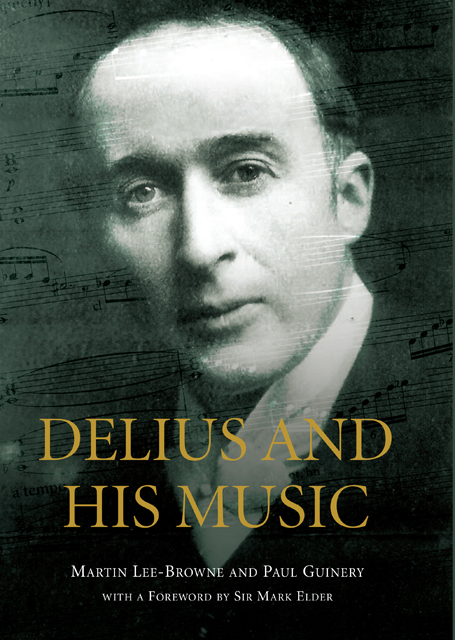Book contents
- Frontmatter
- Contents
- List of Illustrations
- List of Sources and Abbreviations
- Foreword by Sir Mark Elder, CBE
- Preface
- Chapter 1 1862–1888 Youth
- Chapter 2 1888–1892 The Young Composer in Paris
- Chapter 3 1893–1901 Coming to Maturity
- Chapter 4 1902–1905 The Great Noontide and Beecham
- Chapter 5 1906–1910 Acceptance and Friends
- Chapter 6 1911–1914 Inspiration Unabated
- Chapter 7 1915–1918 Winding Down
- Chapter 8 1919–1934 Fenby and the Last Years
- Chapter 9 The Songs
- Chapter 10 1934 and After
- Appendix 1 Delius’s Works in Chronological Order
- Appendix 2 Delius’s Diploma and Reports from The Leipzig Conservatorium
- Appendix 3 Programmes for the 1929 and 1946 Delius Festivals
- Selected Further Reading
- Index
Chapter 7 - 1915–1918 Winding Down
Published online by Cambridge University Press: 24 February 2023
- Frontmatter
- Contents
- List of Illustrations
- List of Sources and Abbreviations
- Foreword by Sir Mark Elder, CBE
- Preface
- Chapter 1 1862–1888 Youth
- Chapter 2 1888–1892 The Young Composer in Paris
- Chapter 3 1893–1901 Coming to Maturity
- Chapter 4 1902–1905 The Great Noontide and Beecham
- Chapter 5 1906–1910 Acceptance and Friends
- Chapter 6 1911–1914 Inspiration Unabated
- Chapter 7 1915–1918 Winding Down
- Chapter 8 1919–1934 Fenby and the Last Years
- Chapter 9 The Songs
- Chapter 10 1934 and After
- Appendix 1 Delius’s Works in Chronological Order
- Appendix 2 Delius’s Diploma and Reports from The Leipzig Conservatorium
- Appendix 3 Programmes for the 1929 and 1946 Delius Festivals
- Selected Further Reading
- Index
Summary
On top of all their other problems, Delius and Jelka’s ‘close and multilayered friendship’ with Ida Gerhardi now came under considerable strain. It dated back to Jelka’s and Ida’s time at the Académie Colarossi, and remained very strong until about 1902, when, for unknown reasons, Delius began to turn his back against Ida, and the friendship seriously cooled and possibly even came close to extinction. The problem, of course, was that Ida and Jelka had always been rivals for Delius’s affections, and Ida – who had very recently finished her second portrait of him – must have been devastated when he married Jelka in the autumn of 1903. There was a reconciliation in 1909, perhaps brought about by Ida’s learning of Delius’s increasing health problems, and all three of them attended a number of concerts of his music together. In 1912, however, Ida caught pneumonia and pleurisy, and gave up her studio in Paris, and the following year she went back to her family home in the Westphalian town of Lüdenscheid – where she remained, a permanent invalid, until her death in 1927. As a result, she was cut off from the Deliuses, and this time, once the War had started, it was probably her very strong pro-German inclinations that seriously risked bringing the relationship to an end for a second time: she wrote to another friend, ‘the Deliuses are so very English that, since understanding is impossible, I have broken off from them; they were particularly malicious in Copenhagen.’ Nevertheless the underlying bond proved sufficiently strong for such manifest and seemingly entrenched attitudes not in fact to endanger the friendship’, with Jelka telling Grainger in 1925 of her disappointment that Ida could not come to help her cope with Delius’s ill-health.
Reasonably happily ensconced in Grove Mill House – although he complained about the cold – it was not long before Delius began writing again.
Air and dance
(1915: RT VI/21; CE vol. 27b)
This is Delius’s only work for string orchestra – attractive and relatively brief. The Air, with its stepwise melodic line and predominantly dotted rhythms, introduced by a solo violin, has the flavour of a Celtic folksong.
- Type
- Chapter
- Information
- Delius and his Music , pp. 349 - 395Publisher: Boydell & BrewerPrint publication year: 2014



